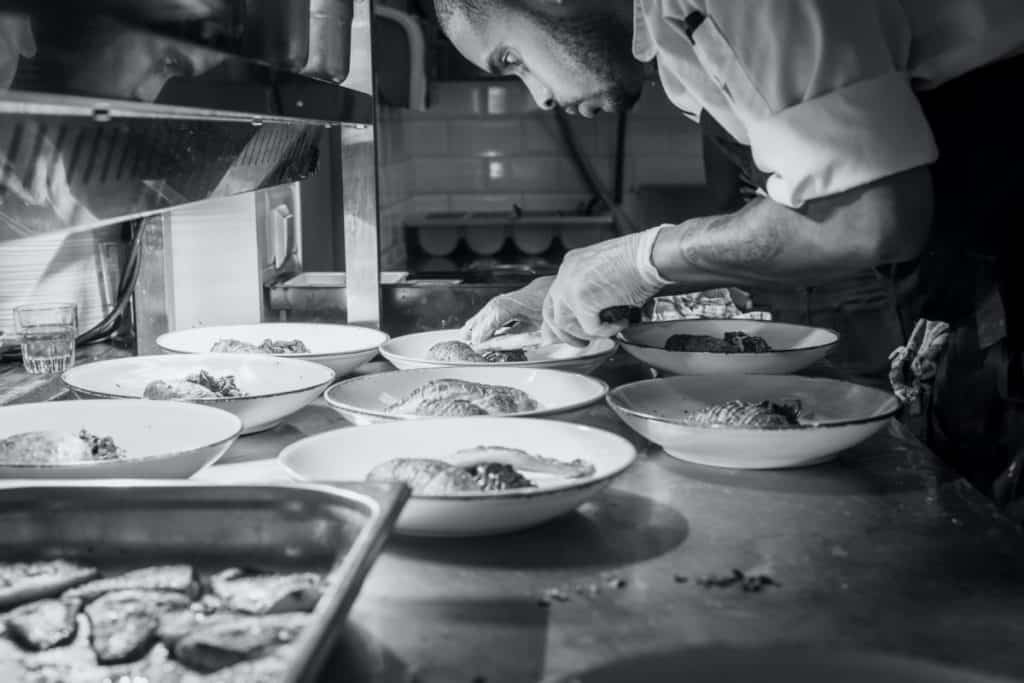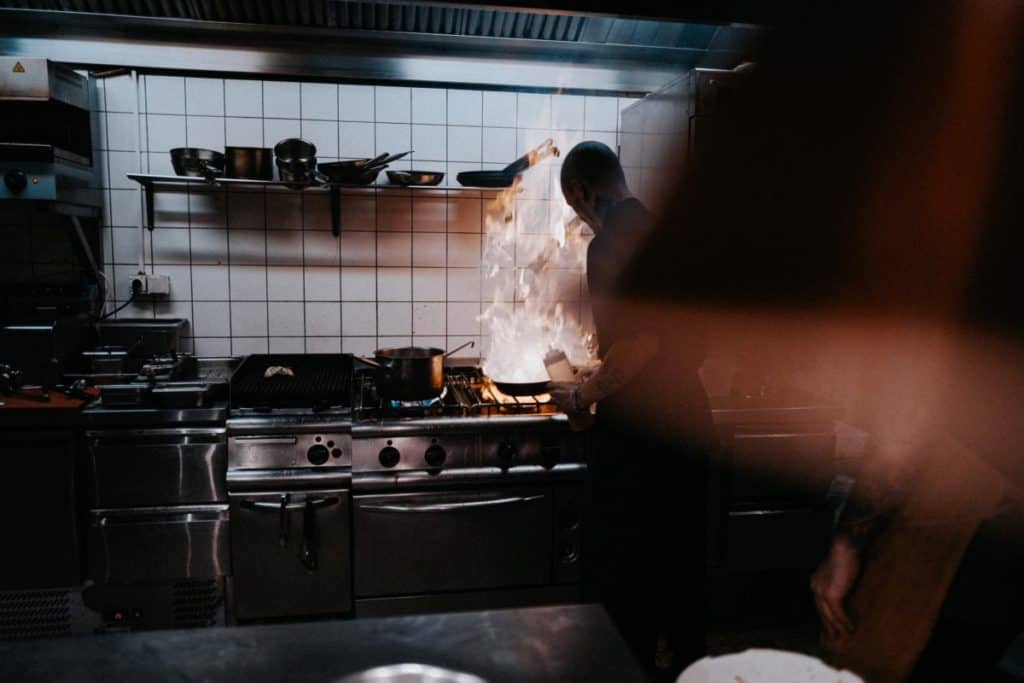
Working in kitchens for many years gives someone a unique inside view into the stresses and pressures that chefs encounter on a daily basis. This article aims to be a honest look at the different mental health issues which affect chefs and how they can be managed.
A career as a chef can be very stressful. The long hours and high pressure environment can lead many chefs to have mental health issues and the subject of burnout is very real within the industry. There are several contributing factors to be aware of and different techniques for mitigating their affects.
Whilst researching for this article I came across a great organisation, the burnt chef project, which has been set up to help chefs with the mental health struggles they often face. I will link to their website here and also at the end of the post.
and also at the end of the post.
I wrestled with the best way to write this article. Should I do lots of research to compile facts and figures about just how many chefs are affected? Whilst this approach does have benefits, such as highlighting how far reaching the mental health issues are within the catering industry , that is not the route I have chosen to take.
I believe anyone reading this article who is looking to become a chef would like to know what pit falls to be aware of, and how best to prepare themselves. Alternatively anyone already in the trade and struggling with mental health issues may be looking for some support.
would like to know what pit falls to be aware of, and how best to prepare themselves. Alternatively anyone already in the trade and struggling with mental health issues may be looking for some support.
With that in mind I have chosen to base this article on my personal experiences, and those of my fellow colleagues. I always aim to give a fair and balanced view to provide the impartial advice which many readers are looking for.
It goes without saying that not all chefs will suffer from these various issues. However, in my experience many do encounter at least one or two of these problems over a career spanning several decades.
8 out of 10 hospitality professionals report having experienced at least one mental health issue during their career
The Burnt Chef Project
Long Working Hours Affect Chefs Mental Health
The long working hours can have a huge impact on a chef’s mental health. As well as being physically demanding they are often mentally exhausting. Finishing a shift late at night and then having to be back in early the next day is a recipe for a lack of good quality sleep.
The wind down factor is of huge importance to chefs. A kitchen service can be very intense with the adrenaline pumping. It is very difficult to simply switch off afterwards and go to sleep. A chef may leave the kitchen at 11pm but by the time they get home, shower, possibly eat and generally wined down it can be more like 1-2am before they get to bed.
can be very intense with the adrenaline pumping. It is very difficult to simply switch off afterwards and go to sleep. A chef may leave the kitchen at 11pm but by the time they get home, shower, possibly eat and generally wined down it can be more like 1-2am before they get to bed.
If they are then required to be in work for the breakfast shift at 7am the next day, this lack of sleep can make it very difficult to function correctly.
at 7am the next day, this lack of sleep can make it very difficult to function correctly.
Choosing work venues which either don’t offer breakfasts, or there are specific breakfast chefs, is a good way to help get some more sleep. The finishing times will still be late; but the later morning starts will hopefully help to compensate.
Unsociable Working Times Can Cause Depression In Chefs
Similar to long hours but another issue in itself is the unsociable days in which chefs are required to be in work.
The nature of being a chef is such that whilst many people are enjoying public holidays and weekends off these will in fact be the busiest times to be at work. The extra number of people not in work and out looking for good food and drinks mean that a kitchen will be all hands on deck for these days.
A chef can request a special day off, such as a bank holiday, or even just a Saturday, but it would require a very large kitchen brigade and an even larger understanding on the head chef’s part to allow the chef to be granted these days off.
The reality is that many of these public holidays will come and go whilst a chef is at work.
Some people are able to make this work to their advantage. Perhaps a chef has a partner who is in a similarly demanding occupation and has to work the unsociable days as well. In this instance they can book quieter days off together, allowing quality time together and enjoying the bars and restaurants without the busyness of everyone else being there.
Even the most understanding partners and families can find this difficult . I personally worked many Christmases and bank holiday days, and these can be especially difficult times. Only the greatest fan of their career would not question their choices in these moments.
. I personally worked many Christmases and bank holiday days, and these can be especially difficult times. Only the greatest fan of their career would not question their choices in these moments.
For balance I will point out that these days can also be really good fun at work. There is a laid back jovial atmosphere, where by everyone gets into the holiday spirit. Those that don’t have a partner or close family may find this kitchen bond actually quite warming at a difficult time.
A technique I often used to help in this area, was to book a weeks holiday after the Christmas period and fortunately my partner was able to do the same. This allowed us to defer Christmas celebrations for a few weeks and even led to some great value holidays.
This never compensated for working the special holidays but I found it did help.
Chefs Have A Very Stressful Work Environment
It’s hard to imagine many jobs where the working environment is as pressure filled or intense as being a chef in a busy kitchen. Alongside the seemingly never ending work load there is a pressure to be ready for service each lunch and dinner time.
These hard and fast deadlines contribute heavily to the pressure a chef can feel. There is no delaying the workload, and often working later into the evening is not an option.
When faced with a huge workload the only options really open to chefs are to forfeit their break and to work faster. This work faster attitude is the reason chefs get so quick with their knife skills and experts at multitasking.
As chef’s progress through there career the ability to manage workload increases. Experienced chefs will look ahead weeks in advance in some cases, utilising things such as the freezer to help them get on top of their prep work.
Beginner chefs tend to struggle more with the work load pressure. They have not yet built up the speed necessary to get themselves out of trouble. They also do not have the bigger picture and are often at the whim of the Chef De Partie
tend to struggle more with the work load pressure. They have not yet built up the speed necessary to get themselves out of trouble. They also do not have the bigger picture and are often at the whim of the Chef De Partie  they are working under as to how much work load they will have each day.
they are working under as to how much work load they will have each day.
Many nights I would return home completely dejected by a long shift where I felt I just couldn’t get on top of things, with the chefs complaints about the time I was taking ringing in my ears.

As a beginner it is normal to struggle and is all part of the learning curve. Do your best to brush negative experiences off as part of the process and know you will get better as time progresses.
More experienced chefs can use a few techniques to help balance the work load.
- Look to outsource work where possible. For example do you need to fillet those fish or can you pay a little more for the fishmonger to do it before delivering them? A slight cost increase but a huge time saver.
- Use good quality ingredients. Starting with good quality ingredients means a chef will not have to spend hours playing with the food in order to make it task delicious. Instead focus on high quality ingredients that can speak for themselves with minimal prep work required.
- Utilise the freezer. If a chef has some down time and they can get ahead, prepare items that can be frozen. A Vac-Pac machine is a great option for sealing food correctly so no flavour can escape.
High Discipline In Kitchens Leads To Chef Burnout
Many new chefs find the high levels of discipline in a kitchen take some adapting to. Being roasted by the head chef (particularly if you feel it is unfair) can be upsetting. Learning to develop a thick skin is important as well as an ability to judge whether or not the criticism was justified.
Thankfully the days of unreasonable head chefs shouting and swearing their way around the kitchen are largely gone. Modern kitchens are a much more pleasant place to work, with respect shown both ways.
their way around the kitchen are largely gone. Modern kitchens are a much more pleasant place to work, with respect shown both ways.
That being said a barrage from a fellow chef can have a large impact on someones mental health, especially when coupled with the other factors mentioned so far.
The knock them down and build them back up mentality can work for some, the armed forces are a great example. However there are concerns over those who leave the industry before they have ever been built back up. The psychological effects could be long lasting.
Try to remember that any criticism is not personal and use it to improve and become a better chef. Having a drink after work with the other chefs is also a great way to quickly repair bridges.
Many times I have had some screaming rows with other chefs to then be laughing about it later on in the bar, its just the nature of the trade.
There are some chefs out there unfortunately that still subscribe to the old school mentality and can only be categorised as bullies.
If a chef is faced with one of these they must remember this person is the exception – not the rule. Find a more suitable kitchen and get away from the old one as fast as possible. These people are dinosaurs and their restaurants will fail quickly anyway as word gets around!
and get away from the old one as fast as possible. These people are dinosaurs and their restaurants will fail quickly anyway as word gets around!
Spending Too Much Time With Colleagues Is Bad For Chefs
Long and Unsociable hours often mean that chefs can find themselves spending more and more of their free time with work mates. This can be great, and a big part of the team atmosphere, but if not careful this can result in feeling like all your time is spent discussing and thinking about work.
For example, when a chef is given a Tuesday and Wednesday off in a week, chances are their old friends will be in work so they inevitably gravitate towards their work mates with the same days off.
When work is going well this is not a problem. However, when work is going bad many chefs can feel like their whole life is wrapped up in the kitchen in which they work. They worry that if they were to leave, not only would they be moving jobs but they’d also be leaving close friends behind.
Another disadvantage is the temptation to discuss work when not even there! We all know that we need time away from work to recuperate. If the people you see outside from work are also work mates it can be very difficult to switch off and give yourself a mental break.
Maintaining a life outside of work can be tricky but it is also very important. Having hobbies or interests that are unrelated give some much needed relaxation time.
Friendships with other chefs that don’t work at the same place as you can also be very beneficial. You have loads in common but don’t spiral into the daily chit chat associated with close workers. This is also a great way to network and discover new jobs, helping to prevent the trapped feeling that can lead to negative emotions.
There Is A Culture Of Alcohol And Drugs Among Chefs
The drinking culture among chefs is largely fulled by the late finish times and high stress levels. Finishing work late at night, most chefs resort to a drink or two in order to help themselves unwind before heading off to bed.
Add to that, the fact that many chefs will choose to go out after work on a Friday or Saturday night whilst also enjoying a drink on their days off and the number of drinks in a week can begin to add up.
The subject of drugs is another more complex issue. I have known many chefs take recreational drugs and would say it is for the same reasons as alcohol listed above. However, I have also known chefs who rely on drugs to get them through a working shift. This can be very upsetting and an ugly side of the catering industry.
This clip featuring Gordon Ramsey shines some light onto the issue of drugs and kitchens.
I always found that having planned activities, such as a round of golf on days off prevented getting bored and heading to the pub for something to do.
The talk to frank website linked here offers some great support for those affected by alcohol or drugs
Relationship Break Downs Are Common For Chefs
Relationships are hard to maintain at the best of times. This is especially true for chefs. Constantly being at work, turning down many social engagements can lead to feelings of frustration and discontent with from their partners.
I have no statistics to back this up but anecdotal evidence from what I have witnessed tells me that chefs have a very high divorce and separation rate. There comes a point where the partner wants someone with a normal career who they can go out with on a Saturday evening or away for the Easter holidays.
Of course some relationships do survive these difficulties and it would be unfair to blame it all on being a chef. However relationship struggles is a contributing factor as to why many chefs develop mental health issues.
Children also come into the picture here. The late nights and early starts can mean a chef sees little of their children for long periods at a time.
can mean a chef sees little of their children for long periods at a time.
Having a partner who has a similar unsociable career can be helpful. Aligning days off to be together gets around the issue of not having weekends off.
If a partner is expressing discontent at the hours a chef is working  it may be time to take a look at other career options. There are lots of opportunities to be a chef but with hours that benefit both, and allow more quality time together.
it may be time to take a look at other career options. There are lots of opportunities to be a chef but with hours that benefit both, and allow more quality time together.
To Sum Up
My intention with this article is not to articulate a list of the reasons not to become a chef. My aim is to provide context so that anyone out there struggling knows that these are common problems and can feel supported.
Reaching out for help early on is the best thing to do. There are lots of options available to improve the situation!
Try and discover the root cause. If the unsociable hours are the main problem consider taking a job that has a lower level of cuisine but allows eveings or weekends off.
For some chefs taking that step to becoming their own boss may be the answer. For example, having your own food truck in which you dictate when and where to work could provide a huge sense of freedom.
Writing options down on paper is a great way to get thoughts out of our heads. It helps us to come up with a plan to improve a situation, instead of burying our heads in the sand until its too late.
I personally felt very burnt out from being a chef and left the industry altogether to retrain as an electrician. I note this here so people can know I’m talking from experience. I know it can be difficult but there are options out there!
Again, that great organisation helping everyone in catering is The Burnt Chef Project.
